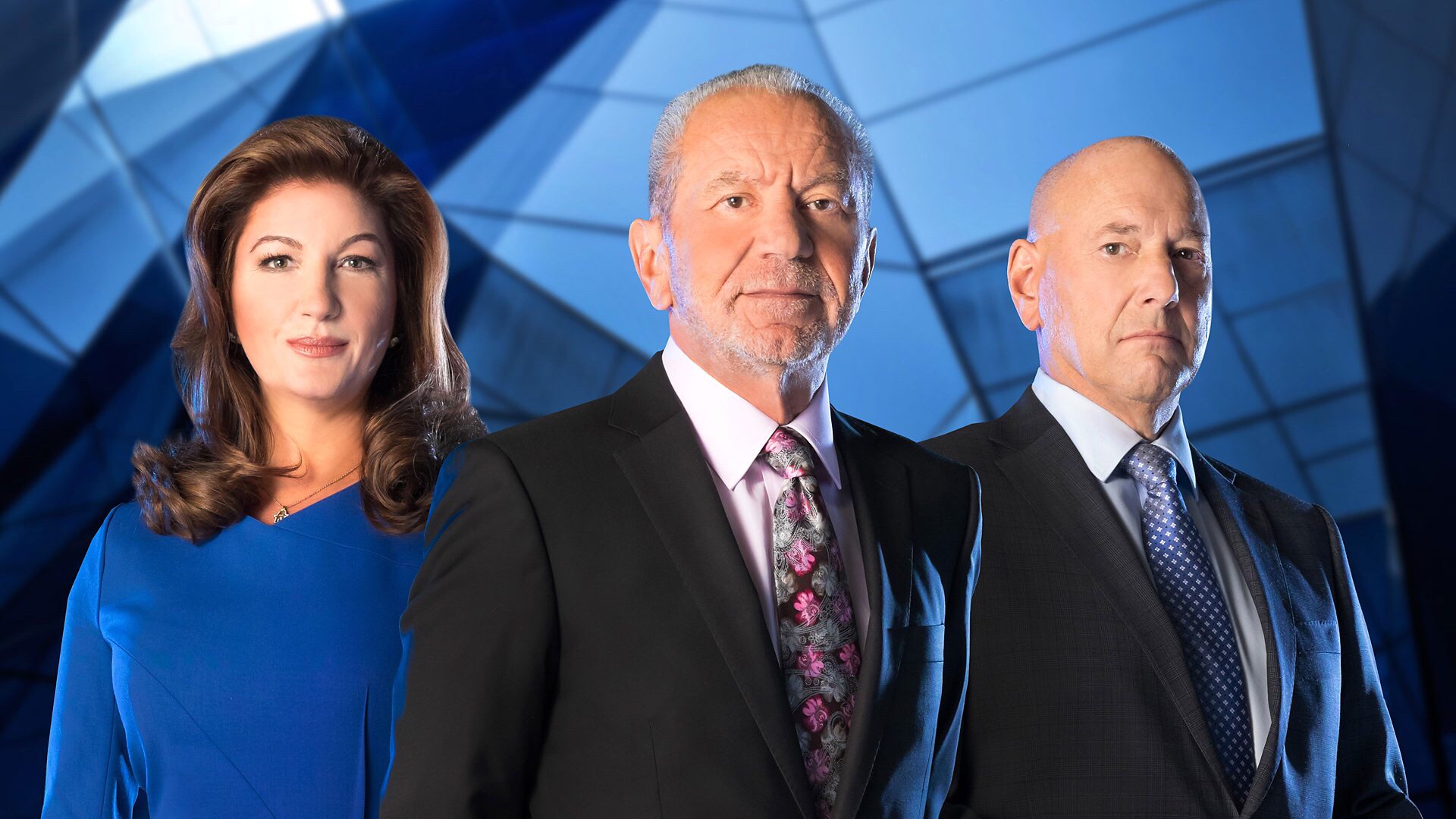
Hosts of The Apprentice UK, Baroness Karren Brady, Lord Alan Sugar and Claude Littner. Brady and Littner replaced Margaret Mountford and Nick Hewer, who were both a delight to watch.
TITLE: The Apprentice UK
GENRE: Reality
STARRING: Lord Alan Sugar, Baroness Karren Brady, Claude Littner and various British people claiming to be “good at business”
PRODUCTION COMPANY/DISTRIBUTION/COUNTRY: BBC One/UK
YEAR: 2005 – present
RATING: 👉🏻👉🏻👉🏻👉🏻👉🏻 out of five “You’re fired” fingers
WHERE CAN I SEE IT? There are often entire episodes on YouTube
I. LOVE. The UK version of The Apprentice. For real. Like straight up SQUEAL when I see that a new series is about to pop off. “Isn’t it just like the U.S. version with that human feces some people call their President?” Absolutely not. At least I don’t think so. TBH I’ve never watched not nary one episode of the US version. I don’t care about American capitalism or how people succeed or fail in it. And once I read Emily Nussbaum’s account of re-watching the American Apprentice, I was affirmed, for once, in my good decision-making. Anything that could inflict that trash human Omorosa on us couldn’t be at all useful in my world. And once the US turned to a celebrity focus, I really couldn’t be bovvered, mate. The majority of American celebrities probably barely finished high school, so I’m skeptical of their ability to start and run a business without a legion of advisors. The rhetoric of “innate” business skills is a flim-flam, shim-sham of US capitalism.
And that’s what makes The Apprentice UK fascinating and, at times, side-splittingly funny.
It’s an approximation by British people (most of them barely into adulthood) bigging themselves up in what they think are the grandiose terms that Very Successful American Businessmen would use. “Trumpian,” to be exact. Superlatives abound and they simply ring absurd for a country that’s made a special artform out of self-deprecation. Take this Cheese Whiz, for example, who actually won series 11:
Over the course of 13 seasons (that’s about as long as Project Runway’s been on the air), you’re often left staring at the screen, unable to believe the self-delusion at play. Or howling with laughter and asking, as the comedians on the after-show do, did these contestants even watch the show before they made complete and utter arses or of themselves on TV? As The Guardian put it, “Here they come again then, a fresh batch of tossers with their wheelie suitcases stuffed full of ambition, egotism and gibberish.” That’s case every.magical.season.
My bet is no because they all only seem to know the bare minimum about the show’s host, Baron Alan Sugar: he was a poor kid from London’s East End (back when Cockney accents rang through the streets and the hipsters invade). He shook off a poor background by selling electronics out of a van and later produced one the the UK’s first popular home computers, the Amstrad PC (a competitor to the Commodore 64).
Folks used to call him, “Suralan,” a mushmouth blending of the “Sir” title and his name, until he became a Lord in 2009. Despite becoming a Baron in 2016, contestants still call him, “Lord Sugar,” but he’ll always be Suralan to me.
I refuse to get into the weeds of any controversies about Suralan because I enjoy The Apprentice UK too much to have it ruined. Hey, I’ve finally cut Morrissey loose! Lemme keep something. I’m not sure who writes Suralan’s one liners, but they’re often punny and just this side of unnecessarily mean. I enjoy him because he’s obviously amused with himself in a way that I find entertaining.
What contestants consistently fail to understand is that Suralan is not here for your games! He’s legit in it to find his next business partner. The prize started off as a £100,000 a year job in Lord Sugar’s company, but has shifted these days to a £250,000 investment in the winner’s business enterprise.
A typical episode goes like this:
- The candidates are awakened with various states of bedhead by an early morning call telling them they have 20 minutes to get ready before the cars pick them up.
- They meet Lord Sugar and his business associates Baroness Karren Brady (dry humored and observant AF, but she needs a better ghostwriter for her opinion columns in the press) and Claude Littner (also hilarious, incisive but deeply invested) at a fancy location to revive their challenge. The challenges are actually interesting and they test the candidates’ leadership style, organizational skills, use of resources, and common sense (this part is often lacking BIGLY).
- The candidates go back to the house and figure out who’ll be team leader (aka thrown under the bus immediately if the team fails or claiming all the credit if they win) and divide up task. This is when you can see who’s way out of their depth because they hang back or make a lot of excuses for not participating like they should.
- The two teams, often with a terrible name they’ve adopted (“EXCELSIOR, “EPIC” and the like), go off and make a dog’s dinner of the task. The majority of the tasks are launching a product with the word “luxury” tacked on and include sourcing stuff, branding and marketing, shameful market research (ask five people on their lunch break) and just barely meeting deadline. The teams then go try to sell their luxury product to punters (customers) or get orders from industry people (small shops, major chains).
- On the day of reckoning, the teams return to the board room and get grilled by Suralan about how they fucked up. There’s also lots of bigging up, obfuscating and some outright lying. Okay Junior Business Dummies, a) there’s video of EVERYTHING and b) Karren and Claude will tell Lord Sugar the truth with receipts. The team making the most money is revealed and they get some weird “treat” like massages or learning how to fence. The losers (MY FAVORITE PART) have to go to this little, downhome cafe and have, presumably, a nice, comforting cuppa (tea) and figure out how they’ll save their own skin back in the boardroom.

- Back in the boardroom Lord Sugar grills them on why they suck and then demands that the team leader bring to two people back in for more scrutiny before someone is let go.
- Lord Sugar hems, haws and does a few fake-outs before pointing at someone–who usually tries a last ditch, ill-advised plea–and saying, “With regret, [insert name of loser], you’re FIRED” and gives ’em the ol’ stubby 👉🏻. The loser then grabs a prop suitcase and rides away in a black cab, reverting to their audition delusions of how amazing at business they are and what Lord Sugar is missing.
My only quibble is that in the UK, when you’re let go from a job, they actually say “sacked.” Or if they want to be really obtuse, you “get your P-45,” which is the tax document you get when you leave any job regardless of circumstance. I knew about P-45s when I left a job London, but I didn’t know everyone got them. When I got mine, I was like, “OY. MATE. I wasn’t fired. I QUIT.” One look from my boss told me to walk that attitude right on back and go look up the many applications of a P-45.
Other highlights are the interview episode where a bunch of really mean associates of Suralan go over the finalist’s resumes (time for some lies to be revealed!), business plans (wildly inflated revenue!) and candidates who need it getting taken down peg.
There’s also a “closer look at the finalists” episode that’s always dead boring. For that matter, the finale is kind dull, too, because it’s often down to two candidates with not-so-great business plans or personalities (except for all-day time fan fave Ruth Badger).
Lastly, it goes without saying that the race politics are hugely problematic. Women of color are often characterized as “difficult.” Men of color are usually comic relief. Doesn’t matter hat the first ever winner was a Black British man; on the aggregate, there’s some super old fashioned stereotyping every season.
The class dynamics are fun to watch for Americans because, while we can’t get enough of claiming to all be middle class (uh, the middle class was cancelled decades ago), Britain wears it’s class politics openly. But in the case of The Apprentice UK, maybe because Lord Sugar is a legit rags-to-riches success story who doesn’t put on airs, working class folks (you can tell by the accent) tend to fair better than people with plummy accents and obvious public school backgrounds (“public” school in England is what we call “private” school in the US).
If you want a look at how business is done in an empire upon which the sun has set, and a preview of the fuckery to visit itself upon America sooner rather than later, check out The Apprentice UK for shits, giggles and even more shits.

Leave a Reply